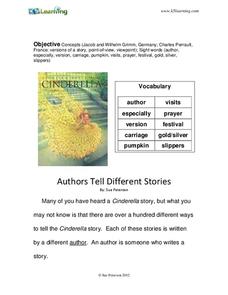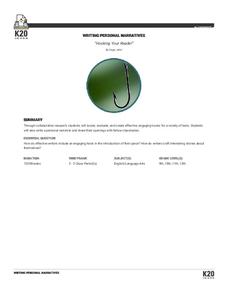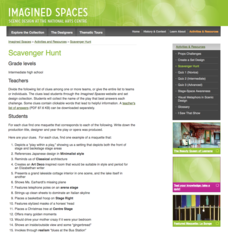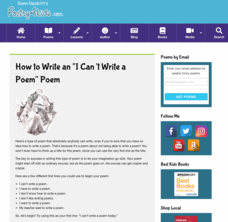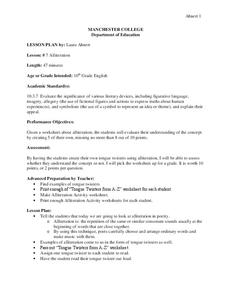EngageNY
Grade 9 ELA Module 1, Unit 1, Lesson 7
A story about feral girls raised by werewolves will have some interesting character development! Track how the girls and their teachers act, speak, and change with a lesson focused on Karen Russell's "St. Lucy's Home for Girls Raised by...
EngageNY
Grade 10 ELA Module 1: Unit 3, Lesson 11
Football fans and ready readers will enjoy a activity based on H.G. Bissinger's Friday Night Lights. Focusing on chapter 4, the activity encourages tenth graders to examine Mike's character development as it relates to the season opener...
Core Knowledge Foundation
Sixth Grade Poetry
Study some of the most prominent poets and works of poetry in history with a language arts poetry unit. From Virgil to Shakespeare to Dickinson to Angelou, the resources present biographies and examples of poetic elements to...
NASA
Discovering the Milky Way
What do you call a tiny collection of galaxies? A puny-verse! Young scholars graph data gathered by scientists studying Cepheids. They attempt to identify a relationship between the variables through standard and logarithmical...
K12 Reader
Valentine’s Day Writing Paper
Just in time for Valentine's Day! Use a template for lined writing paper, complete with hearts, for thematic stories or holiday-themed poetry.
K5 Learning
Authors Tell Different Stories
The story of Cinderella is a popular one! So much so, there are multiple versions of the story being told around the world. With this collection of activities your young readers receive background information about two versions...
Novelinks
Walk Two Moons: Anticipation Guide
Before you begin a unit on Sharon Creech's Walk Two Moons, introduce class members to the literary themes of the book with an anticipation guide. As they read through ten sentences that address different aspects of the plot,...
Civil War Trust
Civil War Soldier: Experiencing the Battle of Franklin
Fighting a war over home soil makes a living nightmare even more real. Class members describe the experience of a Civil War soldier during the Battle of Franklin, poised right at a major turning point of the war, after researching the...
PBS
The Sixties: Notes from the Ho Chi Minh Trail
Young historians research the rationales for fighting the Vietnam War, and the controversies surrounding it. They watch film clips, examine photographs, and read Lyndon B. Johnson's message to Congress to gather information for a...
Art Educators of New Jersey
Exploring Eric Carle’s Painted Collage
Where does inspiration come from? Where do writers get their ideas? What about visual artists? A PowerPoint and a video introduce middle schoolers to children's author and illustrator Eric Carle and how he found inspiration in the work...
K20 LEARN
Hooking Your Reader
Hook your class into inquiry-based, hands-on learning with a activity on narrative leads. Pupils research different types of hooks and decide which one to use in their own writing. Carefully scaffolded to include all learners, the...
National Arts Centre
Scavenger Hunt
Young theatre artists engage in a scavenger hunt to acquaint themselves with set design. The challenge is to search the site and match a separate maquette with each of the 24 clues.
Reading Through History
Anti-Federalist Paper No. 3
Who were the Anti-Federalists and what do primary sources tell young historians about their beliefs? Learners read Paper No. 3 to understand their values in relation to government, such as their discussion on foreign policy and the pros...
Poetry4kids
How to Write an “I Can’t Write a Poem” Poem
Ever have students complain that they don't know how to write a poem? Turn those complaints into magnificent works of writing with an independent poetry lesson about not being able to write poetry.
Reading Vine
Confucius: The Most Famous Teacher in China
Introduce young philosophers to the wisdom of China's most famous thinkers with a short bio. The reading comprehension passage includes an answer key.
Texas Education Agency (TEA)
Syntax (English II Reading)
Lesson five in the series focuses on syntax and the elements that make sentences enjoyable. Learners practice building different clauses and phrases and using figures of speech and rhetorical and literary devices.
Curated OER
Short Story Framework
The class gets creative after listening to a short story containing a definitive structure. They are required to think about character, relationship, and setting, while attempting to show rather than tell, in their writing. Dialogue,...
Alabama Learning Exchange
"Batty" About Bats!! (Writing)
Young writers identify the characteristics of a bat and write an essay about bats. They construct a book about bats that includes information that they have learned through print materials and online resources.
Curated OER
Intermediate Forming Questions --
Students unscramble 8 groups of words to form 8 complete questions beginning with the word "how." This inventive worksheet should be perfect for young writers.
Curated OER
Intermediate Forming Questions --
Students unscramble 8 groups of words to form complete questions using the word "what" on the lines provided. This inventive worksheet should be perfect for young writers.
Curated OER
Alliteration
Help middle schoolers learnd about literary special effects using alliteration. They will review the definition for alliteration and complete several pages of activities that help them learn to identify and use alliteration. The word...
Curated OER
When I Was Young in Brooklyn
Students identify various techniques used in memoirs. They reflect on similarities and differences betwee two authors. Students define the term memior. They write about various techiques they noticed the authors used. Students write...
Curated OER
Using Opening Lines as Writing Prompts
Help your writers get started with these hooks! Twenty-five opening lines from the "Lives" column in the New York Times Magazine act as prompts for creative writing. Have your learners choose one prompt and write an original essay....
K20 LEARN
Sweet and Savory Writing: Descriptive Writing
The engagement is in the details. Young scholars learn the benefit of weaving descriptive and sensory details into the fabric of their writing through the activities in this lesson plan. As their hands explore items concealed in bags, a...







